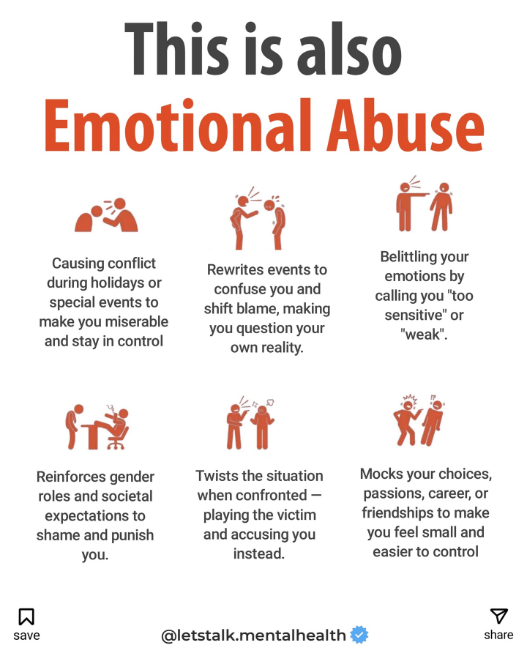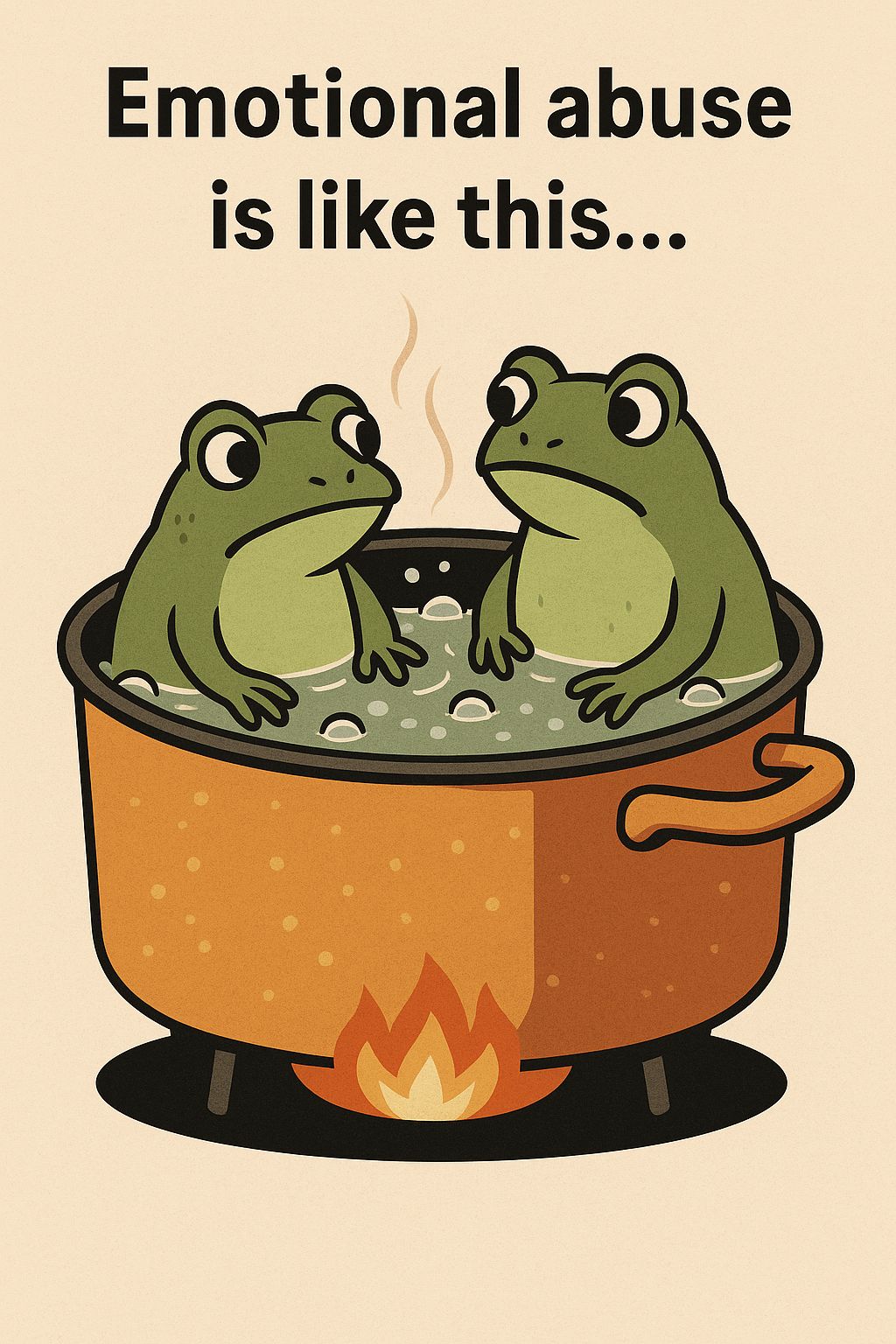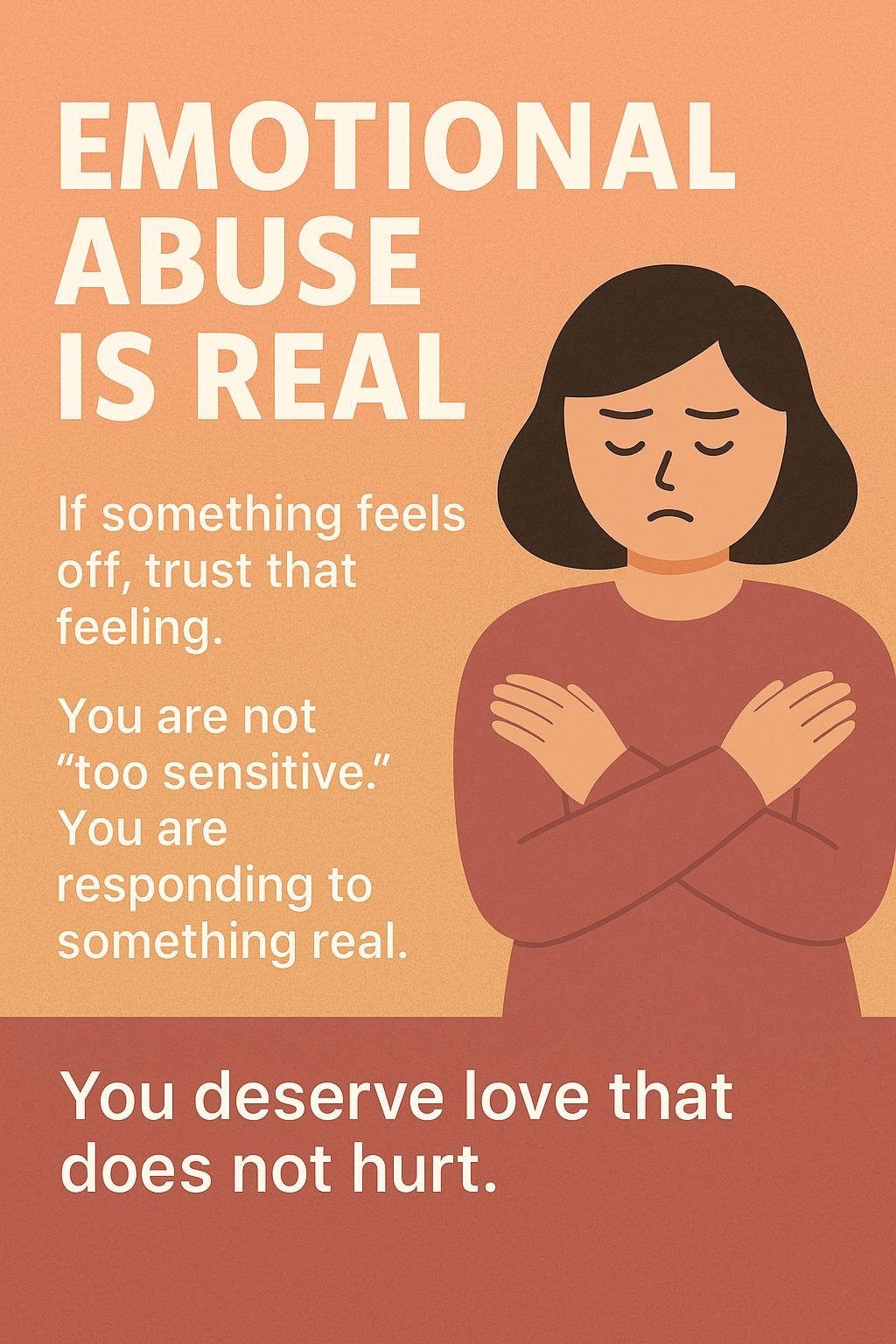- Mental Health Mail
- Posts
- Abuse HIDDEN in Plain Site
Abuse HIDDEN in Plain Site
This issue exposes the subtle nature of emotional abuse—how it hides behind sarcasm, gaslighting, and control masked as care. It explores key warning signs, psychological effects, and practical tools for reclaiming clarity and safety. I aim to reminds readers: emotional harm doesn’t need bruises to leave scars. If something feels wrong, it probably is—and healing begins with naming the truth and taking one small step toward peace.
Some red flags are not so obvious.
Emotional abuse often slips into relationships slowly, wrapped in charm, hidden in sarcasm, and framed as jokes or painted as misunderstandings on YOUR PART. Over time, emotional abuse erodes your sense of reality, chips away at your confidence, and makes you question your sanity.
In this issue, we’re shining a light on those insidious behaviors—how they sneak in, what they sound like, and why listening to that discomfort matters.
Whether you’re in a relationship, reflecting on past ones, or supporting someone else, healing starts with awareness, and you deserve clarity, safety, and peace.

👋 Welcome
Emotional abuse (EA) isn’t always obvious, atleast not at first or once you grow used to it.
EA can show up in small ways—sarcasm disguised as “jokes,” shifting blame on the victim when they speak up, or being told you’re “too sensitive” after someone crosses a line. Victims report that EA leads to them second-guess themselves, question their memory, or feeling like their always the one harming their partners.
This week, we’re offering a resources for learning to spot emotional abuse. Whether it’s from a romantic partner, a family member, or a friend, learning to recognize these red flags is the first step. We’ll walk you through what it can look like, how it can make you feel, and what you can start doing today to protect your peace.

Like sitting in water that gets hotter a little at a time, Emotional abuse can creep in so slowly you don’t realize it’s happening, until you are cooked (burnt & depleted).
If something feels wrong, it probably is.
🔝 Weekly Highlights
🔍 7 Manipulation Tactics to Know
—From love bombing and guilt trips to humiliation—learn the camouflage of control
🎭 Gaslighting: Signs and Tips to Manage
—Destabilizing tactics that make you question your memory, perception, even your sanity—learn how to call them out.
❤️ When Love Turns Sour: Coercive Control
—Subtle dominance, unrealistic demands, and shifting blame are dangerous signs
🔍 Why Setting Boundaries Feels Scary
—Experts explain how fear of conflict, guilt, or rejection can make boundary-setting feel emotionally risky—but that discomfort doesn’t mean your boundary is wrong.
💬 You’re Not “Too Sensitive”
—Being told you’re overreacting is a form of emotional invalidation—and it’s okay to trust your feelings and stand by them.
🌈 Main Feature
How I Fell, Fought, and Finally Freed Myself from Emotional Abuse
I fell hard—attentive, charming, intense in a way that felt special. I felt seen. I felt chosen. Until I didn’t.
Beneath the intensity, small pokes started: my voice was ‘weird’, that joke was lame (in private), I was too sensitive (in public). Conversations were twisted mid-sentance.
I started to apologize—for speaking up, for being hurt, for simply existing in the wrong tone.
At first, I blamed myself. I tried to set boundaries, only to be met with guilt, silence, or emotional withdrawal. I searched “how to know if I’m mentally unstable?” more times than I’d like to admit.
I wasn’t ready to face what I already knew.
But the signs were there—and they’re worth learning to recognize:
You constantly second-guess yourself. You feel like you’re always the one apologizing.
They rewrite reality. You remember something one way, but they insist it never happened—or that you’re misremembering.
Your emotions are dismissed. You’re told you’re “overreacting,” “too sensitive,” or “imagining things.”
Your confidence begins to erode. You question your memory, your needs, your right to feel.
Boundaries feel impossible to hold. You set them, but they get pushed, ignored, or weaponized against you.
Eventually, the fog began to lift. I was drained. Walking on eggshells. My thoughts were tangled. I found myself rereading texts just to validate my own memory. Slowly, steadily, I came to understand: this was emotional abuse. It wasn’t dramatic or a single incident… it was low-key, persistent, and controlling.
My love for this person wasn’t grounding me—it was my undoing.
So I started making changes—not perfectly, but persistently:
I confided in a friend. Saying it out loud helped the confusion take shape.
I journaled when confused. Writing helped me untangle what was real from what I’d been told.
I practiced setting small boundaries. Even when they weren’t respected, I kept trying.
I reached out for help. Therapy gave me language, validation, and a way forward.
I made a plan to leave. It wasn’t one grand escape. It was a slow, steady series of “no more.”
I slipped.
I went back.
I questioned myself.
But each time, I chose myself a little more. I BELIEVED MYSELF A LITTLE MORE. And eventually, I didn’t look back.
I left.
Now, I feel calm more often than not.
I laugh without bracing myself.
I say no and mean it.
Peaceful living isn’t boring—it’s my new baseline.
If something feels off, trust that feeling.
You’re not too sensitive. You’re not imagining it. You’re responding to something real. Keep a journal. Talk to someone safe. Take screenshots. Make a plan. You don’t need to have it all figured out today. You just need one step forward.
If you’re in the fog right now—confused, anxious, shrinking—please hear this: your feelings are real. You are not alone. And you deserve love that does not hurt.
Leaving is hard. But living free is possible. And it’s so, so worth it.

🧬 Quick Hits
🧠 Understanding Trauma Bonds
—Explains why we stay attached to people who cycle between love and hurt—and how recognizing that pattern can help you break it.
📚 Books That Help You Heal
—Curates powerful reads like The Body Keeps the Score and The Drama of the Gifted Child for reclaiming your voice
💔 Leaving Isn’t Easy—But It’s Possible
—Offers a step‑by‑step guide to ending toxic dynamics, finding support, and healing through the pain
👋 Signoff
Sometimes something just feels… off.
Maybe it’s the way someone talks to you. Or how small you’ve started to feel. You might not have the words for it yet—and that’s okay. You don’t need a label to listen to your discomfort.
Start by noticing. Start by naming what you feel. You deserve relationships where you feel safe, respected, and whole.
Until next week,
trust the tug in your gut—it’s trying to protect your heart.
— Mental Health Mail ✨📬